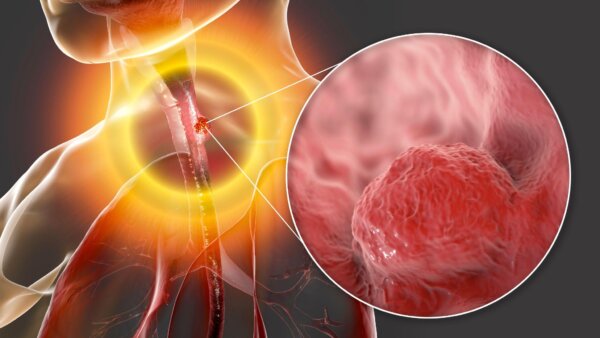Esophageal cancer is relatively common and one of the most challenging cancers to treat. Its symptoms often become noticeable only after the disease has advanced. However, there are numerous early signs of esophageal cancer. Understanding and paying attention to these signs makes early detection and a complete cure possible.
According to the Cleveland Clinic, esophageal cancer typically grows at a rapid rate. Due to the esophagus’s flexible nature, it stretches around the growing tumor. As a result, noticeable symptoms often do not appear until the cancer has reached an advanced stage.
If detected early, health care providers can surgically remove smaller tumors. However, only about 25 percent of esophageal cancer patients are diagnosed before the cancer has spread.
Early Symptoms of Esophageal Cancer
Esophageal cancer is challenging to detect in its early stages, making it crucial to be aware of the subtle symptoms.
- Difficulty swallowing: Discomfort when swallowing food is a common symptom, especially with solid foods. It may feel like something is stuck in the throat or chest.
- Unexplained weight loss: Significant weight loss without an apparent cause is often linked to reduced appetite and difficulties swallowing.
- Chest pain or discomfort: Persistent chest pain or discomfort after eating can be a warning sign.
- Persistent cough and hoarseness: These symptoms may be caused by irritation of the esophagus or tumor growth.
- Indigestion: Frequent indigestion and burning sensations in the stomach that do not respond to standard treatments may indicate early-stage esophageal cancer.
- Vomiting: In severe cases, esophageal cancer can irritate the gastrointestinal tract and trigger vomiting.
- Gastroesophageal reflux: Symptoms such as heartburn and acid reflux often occur before vomiting.
2 Cases of Early Detection and Effective Treatment
Here are two actual clinical cases.
The second patient is Maria, a 60-year-old woman. Maria experienced a chronic burning sensation in her stomach and chest discomfort, which also included some pain, lasting for several months. Initially, she tried using antacids to alleviate the symptoms, but the pain worsened. She then consulted a doctor, who diagnosed her with esophageal cancer. Maria received a comprehensive treatment plan that included radiation therapy, targeted therapy, and high-dose vitamin C infusions. To date, Maria has been leading a very healthy life.
Vitamin C as an Adjunct Therapy for Esophageal Cancer
In the second case mentioned above, high-dose intravenous vitamin C was used to support esophageal cancer treatment. According to information from the National Cancer Institute, some studies on intravenous vitamin C have shown that it can improve cancer patients’ quality of life and reduce cancer-related side effects, with few side effects reported in clinical trials. However, the use of intravenous vitamin C for cancer treatment has not been approved by the U.S. Food and Drug Administration (FDA).
Healthy Habits for Preventing Esophageal Cancer
Like liver cancer, esophageal cancer has a significantly higher incidence in men than in women. In the United States, the lifetime risk of developing esophageal cancer is about one in 127 for men and one in 434 for women. In other words, men are more than three times as likely to develop the disease. This disparity is primarily due to major risk factors such as smoking, alcohol consumption, obesity, and unhealthy dietary habits, which are more prevalent among men than women.
- Avoid smoking and alcohol: In the United States, smoking and alcohol consumption are major lifestyle risk factors for esophageal cancer. Each of these factors significantly increases the risk of developing the disease, and the risk is even higher when both are combined.
- Follow a healthy diet rich in fruits and vegetables: Diets high in processed meats and fried foods are widely associated with increased cancer risk, whereas a diet rich in fruits and vegetables may help lower the risk of esophageal cancer.
- Avoid drinking scalding coffee or tea (above 149 degrees Fahrenheit): Regularly drinking extremely hot beverages can cause long-term damage to the cells lining the esophagus, thereby increasing the risk of esophageal cancer.
- Engage in regular exercise and maintain a healthy weight: Obesity raises the risk of gastroesophageal reflux, which, in turn, can increase the likelihood of esophageal cancer. Regular physical activity helps mitigate this risk.











